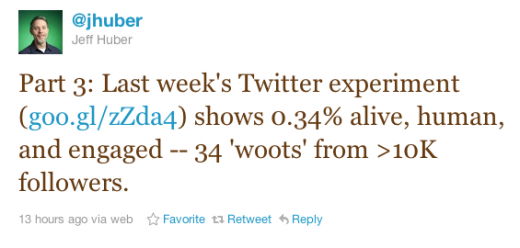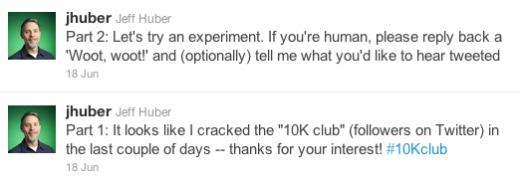Understanding Google My Business & Local Search
@JHuber – Head Of Local at Google, Needs Tweeting Ideas
For those of you that may have forgotten, Jeff Huber is new Head Of Local And Commerce at Google. Jeff is one of the top five folks at Google, having been appointed to the post in the reorg of early April when Larry Page took over. He is in charge of Places, Offers, Maps, & Boost to name a few.
I am sure he is a busy guy but he seems totally (or is it intentionally?) clueless about Twitter and his recent experiment there seems to reinforce that point. Here is a tweet that he sent out Saturday night at 6:30 EST:

Here are part one and part two of his “experiment” upon reaching 10,000 followers on Twitter:

Since his appointment to the head of Local on April 8 he has tweeted a total of 20 times (17 “original” and 3 Rts). Here is a typical tweet from one of the folks in the world that is probably more influential over our lives in Local than God:

I am traveling but I have a huge favor to ask of you all. Send @jhuber a woot, woot tweet today and let him know what you would like to hear about local from Google. I am sure that you can think of something.
© Copyright 2026 - MIKE BLUMENTHAL, ALL RIGHT RESERVED.



Comments
9 Comments
Mike, I woot-ed him yesterday afternoon, but got no reply up to now http://goo.gl/QZ21E I’m not sure if he is doing that simply as a test, or he is really going to reply these tweets. Worth the try anyhow.
Given his rate of previous twitter output, he might not read them until next Saturday. 🙂
omg – scary find Mike 😉
He seems to be more active on G Buzz: https://profiles.google.com/jhuber/buzz
One of the primary questions is what is the nature of local search.
For example, on my smart phone (any mobile device, assuming I haven’t blocked tracking) if I’m on Capitol Hill in Washington, DC and I use Google Places (or any similar app) to search for coffee, I’ll receive different SERPs listings than if I use Google Maps and search: washington dc coffee. The SERPs on Google Maps are the same regardless of whether I were to search — washington dc coffee — from my home computer (Maryland) or from a location across the country. This is, of course, because Google Places on my phone recognized I was on Capitol Hill.
Receiving different results on Google Places vs. Google Maps is exactly why products with which to conduct local searches on mobile devices are growing. Yet, this presents an interesting dichotomy for Google. The algorithms that render results in both Places and Maps place a great deal of value on what is deemed the center. While there are, of course, additional criteria, the distance from center — concentric circles, if you will — receives a great deal of value; the premise that one doesn’t want to walk further than one has to.
On Google Maps the map marker for the center of Washington DC is just below ‘E’ Street NW in the Ellipse — where 16th Street would have been had 16th continued through the Ellipse. (Incidentally the marker, previously, had been placed at 9th Street & Constitution Avenue, NW.) The center of DC by the designation of the quadrants (NE, NW, SE, & SW) is the US Capitol Building. Hence, why for this example using Google Places I chose Capitol Hill. Given the value placed on proximity to the designation of center in Google Maps, business in NW DC garner an advantage.
This is also why Google Maps isn’t really local search. When using Google Places my phone’s location is the geographic center.
An additional question is why what is displayed in SERPs listings vary from one Google product to another. For example on Maps and Places both star ratings and the number of reviews are displayed. On web SERPs the number of Google +1 that have been received are displayed. Why are star ratings displayed on Maps and Places SERPs but not web SERPs and conversely why are +1s displayed on web SERPS but not on Maps or Places SERPs?
That ratings are displayed on one product vs. another is independent of how a particular product’s algorithm may assess value for either a positive rating or the number of ratings received.
I’ll leave ‘totally’ or ‘intentionally’ for another debate. 🙂 Clarifying a bit — I’m a Twitter fan. I was simply looking for a rough measure of the attention to a given tweet, which I do think on average is low. I’m a pretty active user of ~all Google’s products (having built more than a few of them), and other products out there — e.g., . Sometimes my response time does lag a bit, and sometimes I can’t say as much as I’d like about things that aren’t announced yet — sorry.
Oops, my xhtlm is rusty and dropped the end of the href in the prior post. The end of the prior message should read:
I’m a pretty active user of ~all Google’s products (having built more than a few of them), and other products out there — e.g., .
Sometimes my response time does lag a bit, and sometimes I can’t say as much as I’d like about things that aren’t announced yet — sorry.
@Jeff
Thanks for stopping by and responding.
To some extent you are the unintentional recipient of frustration borne of 5 years of irregular, inconsistent, non-informative and often infuriating lack of communications and basic service from the Google Local/Maps/Places side of Google. I think that both SMBs and the professionals that interact with your product would agree….Most of those affected by Google Places are shocked when they feel the sting of a broad, scaled statistical approach to the very real pain of SMBs world wide.
My “totally/intentionally” comment, while perhaps overreacting or projecting previously felt futility, came when I read that tweet and thought that it was but a continuation of the “data in but no information out” and lack of transparency mentality that we have become used to in dealing with Places.
Although your effort to look “for a rough measure of the attention to a given tweet” could also easily be construed as a somewhat awkward attempt to extract data from a very real social context. When in fact it is a social context that is not just one more data point but rather the outcome of all the previous events that got us here… many of which you/Google played a significant role in.
Essentially your tweet was sent into a world made up of users/practitioners that are starved for information about a product that has a very real and profound impact on our lives. And for me at least, I always hope for better from Google.
[…] of you were aware of my efforts to get Local search practitioners and SMB readers of my blog to communicate to Jeff Huber (@jhuber) […]
Comments for this post are closed.